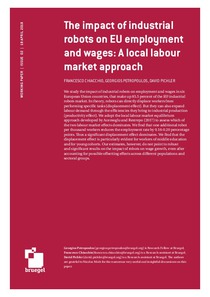The impact of industrial robots on EU employment and wages: A local labour market approach

Chiacchio, Francesco ; Petropoulos, Georgios ; Pichler, David
Bruegel - Brussels
2018
33 p.
robots ; automation ; industrial sector ; employment ; wages ; wage increase
Technology
English
Bibliogr.;Statistics
"The authors of this working paper study the impact of industrial robots on employment and wages in six European Union countries, which make up 85.5 percent of the EU industrial robots market.
In theory, robots can directly displace workers from performing specific tasks (displacement effect). But they can also expand labour demand through the efficiencies they bring to industrial production (productivity effect). The research adopts the local labour market equilibrium approach developed by Acemoglu and Restrepo (2017) to assess which of the two labour market effects dominates.
The authors find that one additional robot per thousand workers reduces the employment rate by 0.16-0.20 percentage points. Thus a significant displacement effect dominates. The displacement effect is particularly evident for workers of middle education and for young cohorts, while men are more affected than women. Estimates, however, do not point to robust and significant results on the impact of robots on wage growth, even after accounting for possible offsetting effects across different populations and sectoral groups."
Digital
The ETUI is co-funded by the European Union. Views and opinions expressed are however those of the author(s) only and do not necessarily reflect those of the European Union or the ETUI.